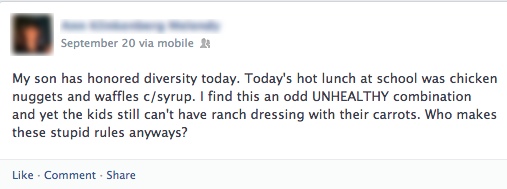I almost put this in the bad person category for the sarcastic reference to diversity. I think she’s implying that chicken and waffles is ethnic food… which is actually part of the problem of getting kids to eat anything that they don’t already like from home. In the end, I didn’t think that it was supposed to be mean, so I’ll take it at face value.
The post did get me thinking a little. First of all, is it true that grade school cafeterias prohibit ranch dressing? Second, how bad is it for our kids?
For the first question, a quick Google search doesn’t seem to support the idea that ranch dressing is banned in very many schools, but I suppose it is possible that this particular school or district has banned Ranch for a specific reason.
So for the second question, I did some searching. I found that 1 oz of real ranch dressing has practically no protein, almost 16 grams of fat and about 150 calories. A ladle use to serve it up is about two ounces and it is assumed that each kid takes 1.75 oz. They literally dish it out by the teenth!
Meanwhile, a 4pc. Chicken McNuggets has 40 more calories, but only 12g of fat plus 10g of protein. McNuggets may actually be healthier. I know some districts are trying, but I think school lunches have been a bit of a joke ever since Ronald Reagan declared Ketchup a vegetable.
Now, not that it is consequential, but you would have to eat exactly twice the maple syrup to get the same calories of the fat-laden ranch dressing we are talking about. They are both bad for you, but ounce for ounce, ranch is the worst.
The thread started getting a little sancimonious and headed toward: “Why aren’t school lunches more healthy anyway?” Here were a couple of followup post…
Fresh fruits and veggies from local farms? I love the idea. Some school districts are even lucky enough to be near actual farms. I think it would be great if schools made healthier meals than the parents of these kids typically make. Even better if the schools could get kids to actually eat those veggies. But hey, fresh food is expensive, it doesn’t keep as long as prepared food and – except in fairy land – a lot of kids will just scrape that stuff off of their plates.
In my opinion, it seems like we are asking a lot of a system that we complain about, but never want to pay for. Maybe you think you can make your kid a nutritious and well balanced meal that they will actually eat* for a buck o five a day, but figure in the time to lovingly prepare, shop for and plan and multiply this by thousands of school kids every day and what should it cost? Schools get something like 27 cents for each paid meal and about $2.85 for each free meal from the federal government. Often, this gets sourced out, but it’s very complex.
It’s something to think about when folks in washington are looking to tighten their belts by limiting SNAP eligibility (which automatically qualifies kids for free or reduced price lunches and breakfast).

